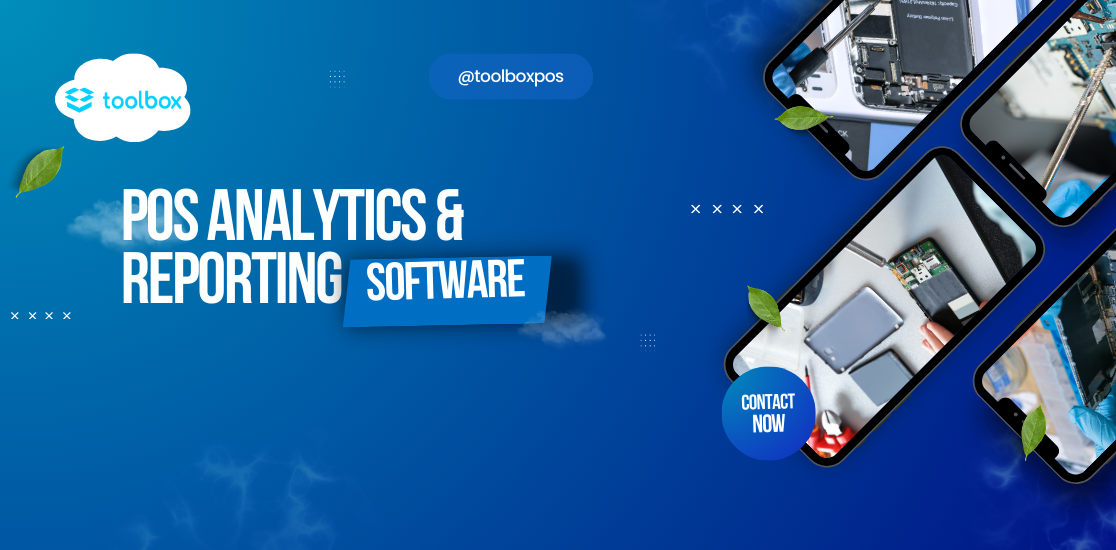POS Analytics & Reporting Software: Uncovering Key Insights for Retail Success

In the competitive world of retail, staying on top of your business’s performance is crucial to maintaining success. One of the most effective tools to help achieve this is Point of Sale (POS) analytics and reporting software. By transforming transaction data into actionable insights, POS analytics helps business owners make informed decisions, optimize operations, and drive growth.
In this blog, we’ll dive into the benefits of POS analytics and reporting software, explore its key features, and answer some common questions.
What Is POS Analytics & Reporting Software?
POS analytics and reporting software are designed to collect, process, and analyze data from your point-of-sale transactions. This software goes beyond basic transaction tracking, offering reports and analytics that provide insight into sales trends, customer preferences, inventory levels, and employee performance. With these insights, you can make smarter business decisions and improve your store’s operational efficiency.
Key Benefits of POS Analytics & Reporting Software
1. Real-Time Insights into Sales Performance
POS analytics software provides real-time sales data, allowing you to monitor daily, weekly, or monthly trends. This immediate access to information enables you to identify peak sales periods, evaluate product performance, and adjust inventory accordingly.
2. Enhanced Inventory Management
Inventory tracking is made easier with POS analytics, helping to prevent stockouts and overstocks. By analyzing historical sales data, you can predict demand for specific products, reduce wastage, and keep your shelves stocked with the right items.
3. Improved Customer Understanding
Analyzing customer behaviour is essential to creating targeted marketing campaigns and loyalty programs. POS analytics software can help you identify popular items, repeat customers, and purchase frequency, enabling you to cater to customer needs more effectively.
4. Optimized Employee Management
Tracking employee performance, including sales and shift productivity, is simplified with POS analytics. By recognizing top performers and identifying areas for improvement, you can foster a productive work environment.
5. Efficient Financial Reporting
POS analytics software can automate financial reporting, minimizing manual errors and saving time. You can generate reports on sales, expenses, and profitability, giving you a clear overview of your financial health.
Essential Features of POS Analytics & Reporting Software
- Sales Reporting: Provides breakdowns of sales by product, category, or time period.
- Inventory Analysis: Tracks stock levels, reorder points, and turnover rates.
- Customer Insights: Allows you to analyze customer data, such as demographics and purchase history.
- Employee Performance Metrics: Monitors productivity metrics and sales for each employee.
- Financial Reports: Offers summaries of revenue, costs, and profits to simplify financial planning.
- Customizable Dashboards: Lets you tailor dashboards to display the KPIs most relevant to your business.
Choosing the Right POS Analytics Software for Your Business
When selecting POS analytics and reporting software, consider the following factors:
- Integration: Ensure the software integrates well with your existing POS system.
- Scalability: Choose software that can grow with your business.
- Ease of Use: A user-friendly interface allows your staff to make the most of the software.
- Customization Options: Customizable reporting helps you focus on metrics that matter most.
- Customer Support: Opt for a provider that offers responsive support and guidance.
Frequently Asked Questions (FAQs)
Q1: How does POS analytics software improve business performance?
A: POS analytics software gives you insights into sales, inventory, and customer behavior, helping you make data-driven decisions. By understanding trends and optimizing processes, you can increase efficiency, reduce costs, and improve customer satisfaction.
Q2: Can POS analytics software help with inventory management?
A: Absolutely. POS analytics tracks inventory movement, highlights best-sellers, and predicts reorder points. This insight ensures you maintain optimal stock levels, reducing the chances of stockouts or excess inventory.
Q3: Is POS analytics software suitable for small businesses?
A: Yes, POS analytics can benefit businesses of all sizes by offering insights that lead to informed decision-making. Many providers offer scalable solutions tailored for small and medium businesses.
Q4: How secure is POS analytics software?
A: Most reputable POS analytics solutions offer robust data security measures, including encryption, secure user access, and regular backups, to protect your business data.
Q5: What types of reports are available in POS analytics software?
A: Common report types include sales reports, inventory reports, customer reports, employee performance, and financial summaries. Many software solutions allow you to customize reports to meet your specific needs.
Conclusion
Investing in POS analytics and reporting software can transform your retail business by providing essential insights into your operations. By leveraging these tools, you can make data-driven decisions that enhance productivity, streamline inventory management, and improve customer satisfaction. Whether you’re running a small shop or a large retail chain, the benefits of a robust POS analytics system can be significant, helping you remain competitive and successful.
